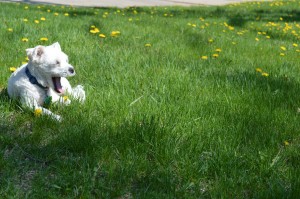
It may look like Pookie is ready to bite the head off of a dandelion, but it took a “reel” mowing to get the yard back to green. (photo/Cindy Hadish)
Should something this green be bad for the environment?
I mowed today for the first time this year and only because my front yard was quickly becoming a sea of yellow. I don’t mind dandelions as much as some people do, but when you have neighbors, you need to be considerate, and mowing is preferable to having dandelion seeds blowing into their yards.
Every year, though, I vow to change, making my yard more aligned with the credo of Fred Meyer’s Backyard Abundance in Iowa City, by replacing the grass with edible plants. Fred also is experimenting with another lawn alternative: no mow grasses. You can read more about that here.
While I don’t have the same enthusiasm for lawn care and lawn “perfection” that many Iowans do, I know some homeowners also are looking for ways to tread lightly on the Earth. If you’d like to move away from chemical herbicides, pesticides and emissions from gas-powered lawn mowers, here are some tips to get started:
– Use corn gluten meal as a natural, pre-emergent weed control.
– Allow your lawn to go dormant during dry spells. If you must water – on newly seeded lawns, for example – do so in the early morning when evaporation is lessened and use a soaker hose rather than a sprinkler.
– Use a “reel” mower than doesn’t take gas or electricity to operate and leave clippings on the ground as a natural fertilizer.
– Keep the mower at a high height; taller grass is better able to resist drought and weeds.
Additionally, ISU Extension notes that organic fertilizers derived from fish emulsion, seaweed, dried sewage sludge, corn by-products, and poultry and cow manure are excellent lawn nutrient sources. Organic fertilizers are unlikely to cause a flush of growth or burn leaf blades and provide a slow release of nitrogen to build soil structure.
You can find other ideas at an upcoming forum at Prairiewoods. Green Iowa AmeriCorps members will lead a Green Living Group session on Greenscaping at 5:30 p.m. Wednesday, May 15, 2013.
AmeriCorps notes that conventional urban lawns contribute to greenhouse gas emissions, reduce water quality, increase storm water runoff and provide little habitat for wildlife. These negative impacts can be reduced through greenscaping, a type of landscaping that helps reduce urban environmental impacts.
Participants will learn how greenscaping can reduce a yard’s carbon footprint, improve water quality, reduce urban storm water runoff and attract wildlife to the yard. Also learn how to design your greenscape to make it your own backyard paradise.
Topics may include:
· Negative impacts of conventional urban yards
· Native vs. exotic vs. invasive plant species
· No-mow lawns, native lawns, natural lawns and rain gardens
· Designing your yard or rain garden
· Attracting wildlife, birds and pollinators
· Choosing the right plants/trees/shrubs
· Proper planting techniques/methods
Cost is $5 and pre-registration is appreciated at 319-395-6700 or www.Prairiewoods.org.

Thanks for helping us spread the word about the upcoming class at PW!